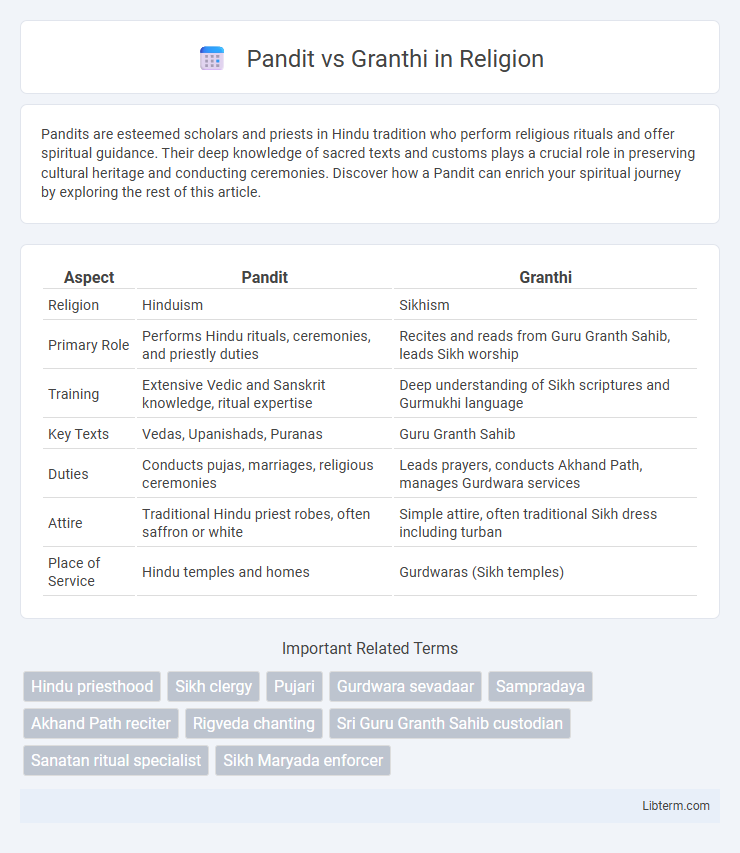Pandits are esteemed scholars and priests in Hindu tradition who perform religious rituals and offer spiritual guidance. Their deep knowledge of sacred texts and customs plays a crucial role in preserving cultural heritage and conducting ceremonies. Discover how a Pandit can enrich your spiritual journey by exploring the rest of this article.
Table of Comparison
| Aspect | Pandit | Granthi |
|---|---|---|
| Religion | Hinduism | Sikhism |
| Primary Role | Performs Hindu rituals, ceremonies, and priestly duties | Recites and reads from Guru Granth Sahib, leads Sikh worship |
| Training | Extensive Vedic and Sanskrit knowledge, ritual expertise | Deep understanding of Sikh scriptures and Gurmukhi language |
| Key Texts | Vedas, Upanishads, Puranas | Guru Granth Sahib |
| Duties | Conducts pujas, marriages, religious ceremonies | Leads prayers, conducts Akhand Path, manages Gurdwara services |
| Attire | Traditional Hindu priest robes, often saffron or white | Simple attire, often traditional Sikh dress including turban |
| Place of Service | Hindu temples and homes | Gurdwaras (Sikh temples) |
Introduction to Pandit and Granthi Roles
Pandits are Hindu priests specializing in performing religious rituals, chanting Vedic hymns, and conducting ceremonies such as weddings and festivals, primarily within temple or home settings. Granthis serve as ceremonial readers and custodians of the Sikh scripture, Guru Granth Sahib, playing a vital role in managing gurdwara services and guiding the spiritual practices of the Sikh community. Both roles are pivotal in preserving and transmitting religious traditions and rituals in Hinduism and Sikhism, respectively.
Historical Origins of Pandits and Granthis
Pandits trace their historical origins to ancient Hindu Brahmin scholars who specialized in Vedic scriptures, rituals, and philosophy, playing crucial roles in temple ceremonies and religious education across India. Granthis emerged over time as custodians of Sikh scriptures and traditions, tasked with the care and recitation of the Guru Granth Sahib within gurdwaras, symbolizing their spiritual and administrative responsibilities. The distinct evolution of Pandits and Granthis reflects the cultural and religious frameworks within Hinduism and Sikhism, respectively, with each role deeply embedded in scriptural expertise and community leadership.
Key Responsibilities of a Pandit
A Pandit primarily performs Hindu religious ceremonies, including rituals, pujas, and yajnas, ensuring adherence to Vedic scriptures and traditions. They offer spiritual guidance, interpret sacred texts, and serve as officiants during weddings, funerals, and festivals. Unlike a Granthi, who manages Sikh scriptures and Gurdwara duties, a Pandit's key responsibilities center on maintaining Hindu ritualistic practices.
Primary Duties of a Granthi
A Granthi primarily performs religious ceremonies and rituals within Sikh Gurdwaras, including reading from the Guru Granth Sahib, preparing the scripture for daily prayers, and managing the religious calendar. Unlike a Pandit, who conducts Hindu rituals and ceremonies, the Granthi's duties center around preserving Sikh traditions and facilitating congregational worship. The Granthi also educates the community on Sikh doctrines and ensures the proper maintenance of sacred texts.
Religious Significance in Hinduism and Sikhism
Pandits in Hinduism are scholarly priests responsible for performing sacred rituals, conducting yajnas, and guiding devotees in Dharma through Vedic scriptures, emphasizing the preservation of Hindu religious traditions. Granthis in Sikhism serve as ceremonial readers and custodians of the Guru Granth Sahib, facilitating Sikh worship and community gatherings without performing sacrificial rites, highlighting the egalitarian and scripture-focused nature of Sikh practices. Both roles hold profound religious significance, embodying the spiritual leadership and ritual expertise unique to their respective faiths.
Training and Qualifications Required
Pandits undergo rigorous training in Vedic scriptures, Sanskrit language, rituals, and astrology, often studying at traditional gurukuls or religious institutions for several years to master Hindu religious ceremonies and chants. Granthis receive specialized training within Sikh gurdwaras, focusing on reading and interpreting the Guru Granth Sahib, Sikh history, and conducting Sikh religious services while mastering traditional kirtan singing. Both roles require deep scriptural knowledge and spiritual discipline, but Pandit training emphasizes Hindu rituals and Vedas, whereas Granthi qualifications center on Sikh liturgy and community leadership.
Rituals Led by Pandits vs. Granthis
Pandits primarily lead Hindu rituals such as pujas, yajnas, and samskaras, emphasizing Vedic chants and classical ceremonies rooted in Sanatan Dharma. Granthis conduct Sikh rituals including reading and interpreting the Guru Granth Sahib during services and guiding ceremonies like the Anand Karaj but do not perform idol worship or fire rituals associated with Hinduism. The distinction lies in Pandits' focus on Vedic rites and Granthis' role in maintaining Sikh liturgical traditions and scripture recitation.
Community Impact and Influence
Pandits play a crucial role in Hindu communities by performing rituals, conducting ceremonies, and preserving religious teachings, thereby fostering cultural continuity and social cohesion. Granthis, serving as custodians of Sikh scriptures and traditions, facilitate spiritual guidance and community gatherings, reinforcing Sikh identity and collective values. Both roles significantly influence their respective communities through leadership in religious practices, education, and the promotion of ethical principles.
Contemporary Challenges and Adaptations
Pandits and Granthis face contemporary challenges including maintaining religious relevance amid rapid urbanization and digital transformation. Pandits adapt by offering virtual rituals and personalized spiritual guidance, while Granthis incorporate community engagement and language preservation to sustain Sikh traditions. Both roles evolve through technology integration and cultural shifts to address modern congregational needs efficiently.
Conclusion: Comparing Spiritual Leadership
Pandits primarily serve as Hindu priests specializing in performing rituals and guiding community worship, while Granthis function as custodians and priests within Sikh gurdwaras, responsible for managing scripture recitation and religious ceremonies. Both roles embody distinct spiritual leadership models shaped by their respective religious traditions, emphasizing ritual expertise and community guidance. Choosing between Pandit and Granthi reflects differing theological frameworks and cultural practices within Hinduism and Sikhism, highlighting diverse approaches to spiritual authority.
Pandit Infographic

 libterm.com
libterm.com